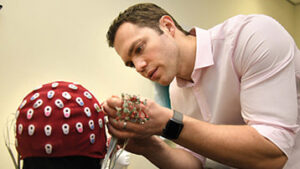Discuss on Tinnitus Talk Forum
 This episode is an opportunity to learn about what’s going on in the brain of someone with tinnitus. Dr Will Sedley explains, in very clear and easy-to-understand terms, his own theory on the mechanisms underlying tinnitus, as well as the main other theories in the field.
This episode is an opportunity to learn about what’s going on in the brain of someone with tinnitus. Dr Will Sedley explains, in very clear and easy-to-understand terms, his own theory on the mechanisms underlying tinnitus, as well as the main other theories in the field.
We also cover topics like: the factors that trigger the onset of tinnitus, whether there are many different causes of tinnitus or really only one, the analogy with other conditions like chronic pain, the reliability of animal models, the need for an objective marker of tinnitus, and the thorny issue of whether tinnitus subtypes really exist.
Understanding the origins of tinnitus is key to developing better treatments, which is why we’d like to see more neurologists follow Will Sedley’s lead.
Do you like Tinnitus Talk Podcast and would you like to support our work?
Become a Patreon for as little as $2/month!
Would you like to read a transcript of the interview?
We have prepared one for you. Click here for the transcript (PDF).
Skip to: 00:00 Introducing Dr. Will Sedley.
Skip to: 08:10 Early tinnitus models.
Skip to: 16:12 Will’s tinnitus model based on predictive processing.
Once you’ve recognised it once, it’s very hard to ‘unlearn’ something, to forget it, or to no longer recognise it.
Skip to: 36:13 Overview of other tinnitus models.
Skip to: 46:16 Will’s current research and plans.
Skip to: 50:02 Finding an objective measure of tinnitus.
If your measure doesn’t actually reflect tinnitus, but something else, and then you come up with a medication that you give to animals and it normalises it, you may be treating something other than tinnitus and that would be one of several possible reasons that treatments that work in animals often don’t seem to work in humans.
Skip to: 61:53 Sound therapy plans.
Skip to: 64:46 Subtyping tinnitus.
The thing I do occasionally take a bit of issue with is the argument that the treatments are there already and the reason they’re not working is because of subtypes — that actually if we just matched our existing treatments correctly to the right people, then everyone or lots of people could be cured. A response I give to that is: show me the one person you cured and then we’ll deal with why we’re not curing everybody.
Skip to: 68:16 Acute versus chronic tinnitus.
Skip to: 71:45 Research collaboration.
I was born deaf. I wear hearing aids. I have tinnitus & hyperacusis. If there is any therapy or pills to calm musical ear syndrome, I would appreciate your help or information. What doctor could I go see?
Poor soul. I feel your pain. I have tinnitus too. Seems that everyone is a little different!
I have both tinnitus and visual auras. I am 68 years of age. I have had visual auras since I was 30 years of age. It progressed later in life to two attacks per day on occasions. I also have many floaters. Now I have a detached vitreous.
However, getting back to the visual auras, I have managed to stop them. All my life I have been a heavy coffee drinker. Lots of strong cups of coffee every day. One day I had an attack and had to sit down outside this suburban shop. I had a mate with me at that time. He asked me what was wrong and I explained to him about visual auras. A couple of weeks later, he told me that he was watching a programme on TV. The programme mentioned that coffee was bad for your eyes. He said to me that he noticed that I drank lots of coffee. I did not give any credit to what he said, however I decided to give it a go and I stopped all caffeine e.g., coffee and Coca-Cola. After two months the visual auras stopped. It’s now been 7 years and I have not experienced one aura attack.
I still have the rotten tinnitus though. If you get visual auras and if you drink lots of coffee or Coca-Cola, give this a try and stop these beverages and from two months onwards, see if the visual auras stop.